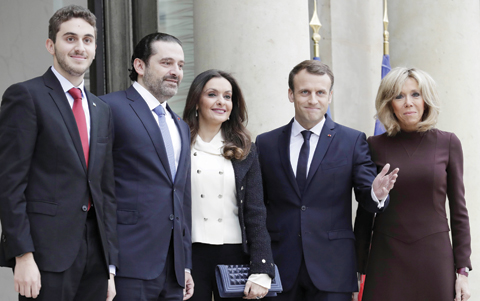Outgoing PM meets Macron in Paris - Saudi Arabia recalls ambassador to Germany
 PARIS: French President Emmanuel Macron (second right) and his wife Brigitte (right) welcome Lebanese Prime Minister Saad Hariri, his wife Lara and their son Houssam at the Elysee Presidential Palace yesterday. - AFP
PARIS: French President Emmanuel Macron (second right) and his wife Brigitte (right) welcome Lebanese Prime Minister Saad Hariri, his wife Lara and their son Houssam at the Elysee Presidential Palace yesterday. - AFPPARIS: Prime Minister Saad Hariri said he will return to Lebanon for Wednesday's Independence Day celebrations and explain his situation, after his shock resignation announcement in Saudi Arabia sparked political turmoil. Speaking after talks in Paris yesterday with French President Emmanuel Macron, who is seeking to broker a way out of the crisis, Hariri said he would "make known my position" once back in Beirut. "As you know I have resigned, and we will discuss that in Lebanon," he said told reporters, saying he needed to meet with President Michel Aoun before taking further steps.
Hariri's announcement follows two weeks of deep uncertainty after his surprise decision to step down on Nov 4. His failure to return to Lebanon since then sparked rumors that he was being held in Riyadh against his will, which both he and Saudi officials denied. "To say that I am held up in Saudi Arabia and not allowed to leave the country is a lie," he said in a Twitter post just before flying to Paris overnight.
Hariri's wife and eldest son Houssam joined him for lunch with Macron at the Elysee Palace, but their two younger children, who live in Saudi Arabia, have remained there "for their school exams", a source close to the premier said. "Hariri does not want to mix his children up in this affair," the source said. His mysterious decision to step down - which Aoun has refused to accept while Hariri remains abroad - has raised fears over Lebanon's fragile democracy.
Hariri's camp has sought to allay the concerns, with a source saying the premier had a "fruitful and constructive" meeting with the powerful Saudi Crown Prince Mohammed Bin Salman before leaving. Hariri, a dual Saudi citizen who has previously enjoyed Riyadh's backing, resigned saying he feared for his life. He accused Saudi Arabia's arch-rival Iran and its powerful Lebanese ally Hezbollah of destabilizing his country.
Hariri's resignation was widely seen as an escalation of the battle for influence between Saudi Arabia and Iran, which back opposing sides in the conflicts in Syria and Yemen. His attempt to step down also coincides with a purge of more than 200 Saudi princes, ministers and businessmen. Hariri met French Foreign Minister Jean-Yves Le Drian in Riyadh on Thursday as Paris, which held mandate power over Lebanon for the first half of the 20th century, seeks to ease the crisis.
In another development, Riyadh yesterday recalled its ambassador to Berlin in protest at comments by Germany's Foreign Minister Sigmar Gabriel which were interpreted as a suggestion that Hariri acted under Saudi orders. Without mentioning Saudi Arabia directly, Gabriel had said Thursday that he shared concerns about the threat of instability and bloodshed in Lebanon and warned against "adventurism". "Lebanon has earned the right to decide on its fate by itself and not become a pinball of Syria or Saudi Arabia or other national interests," he had said earlier in the week. Germany's foreign ministry had yet to comment on the row, but in a statement it welcomed Hariri's "imminent return to Lebanon".
"Such remarks provoke the surprise and disapproval of the Kingdom of Saudi Arabia which considers them as aimless and based on false information that would not help bring about stability in the region," the Saudi foreign ministry said. The ministry later said on its Twitter account it had summoned the German ambassador in Riyadh and handed him "a protest memorandum over the shameful and unjustified remarks made by the German Foreign Minister Sigmar Gabriel".
Ahead of Hariri's departure, Aoun - an ally of Hezbollah - welcomed the trip to Paris, expressing hope that it was the "start of a solution". "If Mr. Hariri speaks from France, I would consider that he speaks freely," Aoun said. "But his resignation must be presented in Lebanon, and he will have to remain there until the formation of the new government."
France's intervention was the latest in a string of European efforts to defuse tensions over Lebanon, where divisions between Hariri's Sunni bloc and Shiite Hezbollah have long been a focal point in a broader struggle between Riyadh and Tehran. Hariri - whose father, ex-prime minister Rafiq Hariri, was killed in a 2005 car bombing blamed on Hezbollah - took over last year as head of a shaky national unity government which includes the powerful Shiite movement. Saudi Arabia's Foreign Minister Adel Al-Jubeir insisted from Madrid that "unless Hezbollah disarms and becomes a political party, Lebanon will be held hostage by Hezbollah and, by extension, Iran". - Agencies










